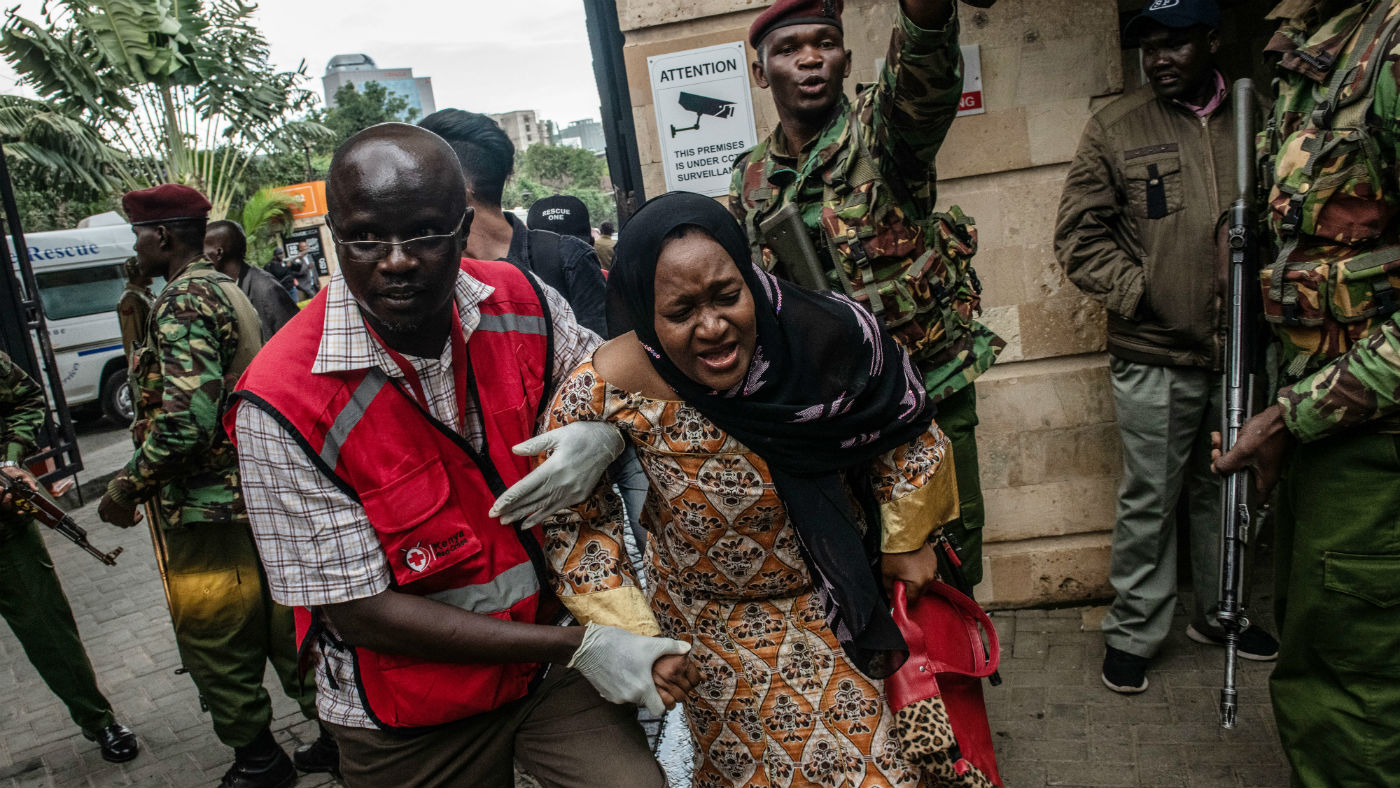Kenya hotel attack: 21 dead, 50 still missing
Al-Shabaab terrorist group says attack was ‘response’ to Donald Trump’s decision to move Israeli capital to Jerusalem

A free daily email with the biggest news stories of the day – and the best features from TheWeek.com
You are now subscribed
Your newsletter sign-up was successful
At least 21 people have been killed and more than 50 are still missing following a major terrorist attack in the Kenyan capital of Nairobi.
An American and a Briton are among those confirmed to have died when militants armed with guns and grenades stormed the DusitD2 hotel and office compound on Tuesday afternoon, CNN reports.
The five attackers are believed to have been members of Somali terror group al-Shabaab, which immediately claimed responsibility for the attack.
The Week
Escape your echo chamber. Get the facts behind the news, plus analysis from multiple perspectives.

Sign up for The Week's Free Newsletters
From our morning news briefing to a weekly Good News Newsletter, get the best of The Week delivered directly to your inbox.
From our morning news briefing to a weekly Good News Newsletter, get the best of The Week delivered directly to your inbox.
Gunfire between security forces and militants continued into the early hours of Wednesday. This morning President Uhuru Kenyatta told reporters police had brought the situation under control and that all the terrorists had been “eliminated”.
The official death toll, initially reported as 15, rose to 21 yesterday as authorities recovered more bodies from the scene.
A total of 16 Kenyans, one Briton, one American and three unidentified people of African origin are confirmed to have been killed.
At least 28 people have been hospitalised with injuries, and investigators are attempting to trace a further 50 people who remain unaccounted for, reports the BBC.
A free daily email with the biggest news stories of the day – and the best features from TheWeek.com
The jihadist attackers stormed the complex at around 3pm local time on Tuesday. Surveillance footage showed one of the militants detonating a suicide vest in the foyer of the hotel.
In the moments after the explosions, “flames and plumes of black smoke billowed into the sky from the parking lot of the compound where several vehicles were on fire”, says Al Jazeera, which reports that “scores of people” were seen fleeing on foot, some of them injured.
“One man came out covered in blood,” and an image of the aftermath circulating on social media “showed what appeared to be a human leg” lying on a path outside the hotel, reports Reuters.
According to the news agency, al-Shabab issued a statement calling the attack “a response” to US President Donald Trump's decision in December 2017 to recognise Jerusalem as the capital of Israel.
The group said that its fighters stormed the complex on the instructions of al-Qa'eda leader Ayman al-Zawahiri, adds South-Africa based website News24.
“It is a response to the witless remarks of the US president, Donald Trump, and his declaration of Al-Quds (Jerusalem) as the capital of Israel,” the statement said.
“Al-Quds will never be Judaised. Know that we will hold you to account for every Muslim blood spilt in Palestine; ounce for ounce.”
Meanwhile, in a televised address, President Kenyatta vowed that the Kenyan government would “relentlessly” pursue “every person that was involved in the funding, planning and execution of this heinous act”.
-
 How the FCC’s ‘equal time’ rule works
How the FCC’s ‘equal time’ rule worksIn the Spotlight The law is at the heart of the Colbert-CBS conflict
-
 What is the endgame in the DHS shutdown?
What is the endgame in the DHS shutdown?Today’s Big Question Democrats want to rein in ICE’s immigration crackdown
-
 ‘Poor time management isn’t just an inconvenience’
‘Poor time management isn’t just an inconvenience’Instant Opinion Opinion, comment and editorials of the day
-
 Epstein files topple law CEO, roil UK government
Epstein files topple law CEO, roil UK governmentSpeed Read Peter Mandelson, Britain’s former ambassador to the US, is caught up in the scandal
-
 Iran and US prepare to meet after skirmishes
Iran and US prepare to meet after skirmishesSpeed Read The incident comes amid heightened tensions in the Middle East
-
 Israel retrieves final hostage’s body from Gaza
Israel retrieves final hostage’s body from GazaSpeed Read The 24-year-old police officer was killed during the initial Hamas attack
-
 China’s Xi targets top general in growing purge
China’s Xi targets top general in growing purgeSpeed Read Zhang Youxia is being investigated over ‘grave violations’ of the law
-
 Panama and Canada are negotiating over a crucial copper mine
Panama and Canada are negotiating over a crucial copper mineIn the Spotlight Panama is set to make a final decision on the mine this summer
-
 Why Greenland’s natural resources are nearly impossible to mine
Why Greenland’s natural resources are nearly impossible to mineThe Explainer The country’s natural landscape makes the task extremely difficult
-
 Iran cuts internet as protests escalate
Iran cuts internet as protests escalateSpeed Reada Government buildings across the country have been set on fire
-
 US nabs ‘shadow’ tanker claimed by Russia
US nabs ‘shadow’ tanker claimed by RussiaSpeed Read The ship was one of two vessels seized by the US military